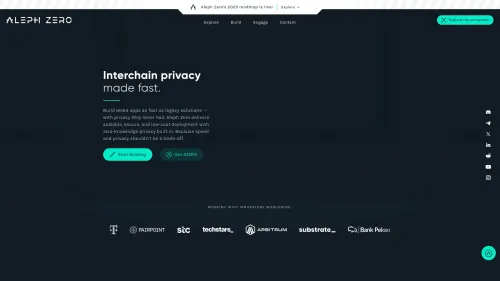Aleph Zero (AZERO)
Aleph Zero is a public blockchain designed to enhance privacy and is integrated with the Substrate stack. It aims to overcome the limitations of current distributed ledger technology by offering increased speed, improved validation times, scalability, and security. Established in 2018, the platform was co-founded by Adam Gagol, Antoni Zolciak, Matthew Niemerg, and Michal Swietek.
Overview

| Ticker | AZERO |
| Category | Smart Contract Platform |
| Website | https://alephzero.org/ |
| @Aleph__Zero | |
| Telegram | AlephZeroAnnouncements |
Aleph Zero utilizes Directed Acyclic Graph (DAG) technology to create a decentralized and efficient system. It offers rapid validation times, scalability, and enhanced security. The platform's "hub and spoke" model allows businesses to maintain private networks while interacting on a decentralized ledger. In performance tests, Aleph Zero achieved 416-millisecond validation times for 89,600 transactions per second using AWS nodes. The blockchain incorporates zero-knowledge proofs (ZKPs) and secure multi-party computation (sMPC) to ensure data security and privacy, aiming to facilitate efficient communication for SMBs and enterprises.
Technology
AlephBFT consensus
The Aleph Zero blockchain employs the AlephBFT consensus protocol, which was presented at the Advances in Financial Technologies (AFT) 2019 conference. This protocol uses a modified Proof of Stake (PoS) consensus algorithm alongside DAGs. The use of DAGs allows for faster transaction speeds, higher throughput, and significantly lower transaction fees, making it suitable for mass adoption.
Shielder
The Aleph Zero Shielder is a smart contract using zk-SNARKs technology to enable private payments within DeFi. It enhances privacy by preventing third-party observers from linking user actions. The Shielder allows for secure token transfers within a shielded pool and supports optional features like user registration and anonymity revocation.
MOST
MOST is a bridge between Aleph Zero and Ethereum, introduced in September 2023. It facilitates the movement of liquidity and stablecoins, encouraging DeFi growth on Aleph Zero. This guardian-based bridge ensures decentralization and offers reduced fees for bridging assets, with external audits ensuring security.
Liminal
Liminal extends Aleph Zero by enhancing security and privacy and acts as a gateway to other blockchains like Ethereum and Binance Smart Chain. It combines ZK-SNARKs and Secure Multiparty Computation (sMPC) to maintain the confidentiality of transactions and client data.
aScan
aScan is a token explorer for Aleph Zero, focusing on PSP-22 tokens. It provides detailed insights into each token, including supply and transaction history, ensuring transparency and offering developers a platform to showcase projects.
AZERO
The AZERO coin serves as the foundational currency within the Aleph Zero ecosystem. It supports essential operations such as reducing transaction costs on decentralized exchanges and facilitating seamless asset transfers. AZERO is also used as collateral for wrapped assets and for validator node staking, contributing to network stability and security.
Tokenomics
Aleph Zero has allocated 23% of its tokens to the Aleph Zero Foundation and 10% to the team, with plans to use these tokens for research, marketing, and ecosystem incentives. The team allocation is locked and vested over several years, with early contributors receiving tokens through structured funding rounds.
Partnerships
Integrations
Aleph Zero has integrated with various platforms, including Galxe, Koinly, Bitpanda, Router Protocol, Nova, Zondax, Subscan, Metamask, Lukka, Talisman, and Gatenox.
stc Bahrain
On April 16, 2024, Aleph Zero partnered with stc Bahrain to enhance its Web3 initiatives. This partnership involved deploying validator nodes and participating in stc's Web3 Launchpad Program to accelerate blockchain adoption in the Middle East.
Digital Euro Association
On February 13, 2024, Aleph Zero joined the Digital Euro Association (DEA) to contribute to the development of digital currencies. This collaboration emphasizes security, privacy, and efficiency in shaping the future of digital money.
